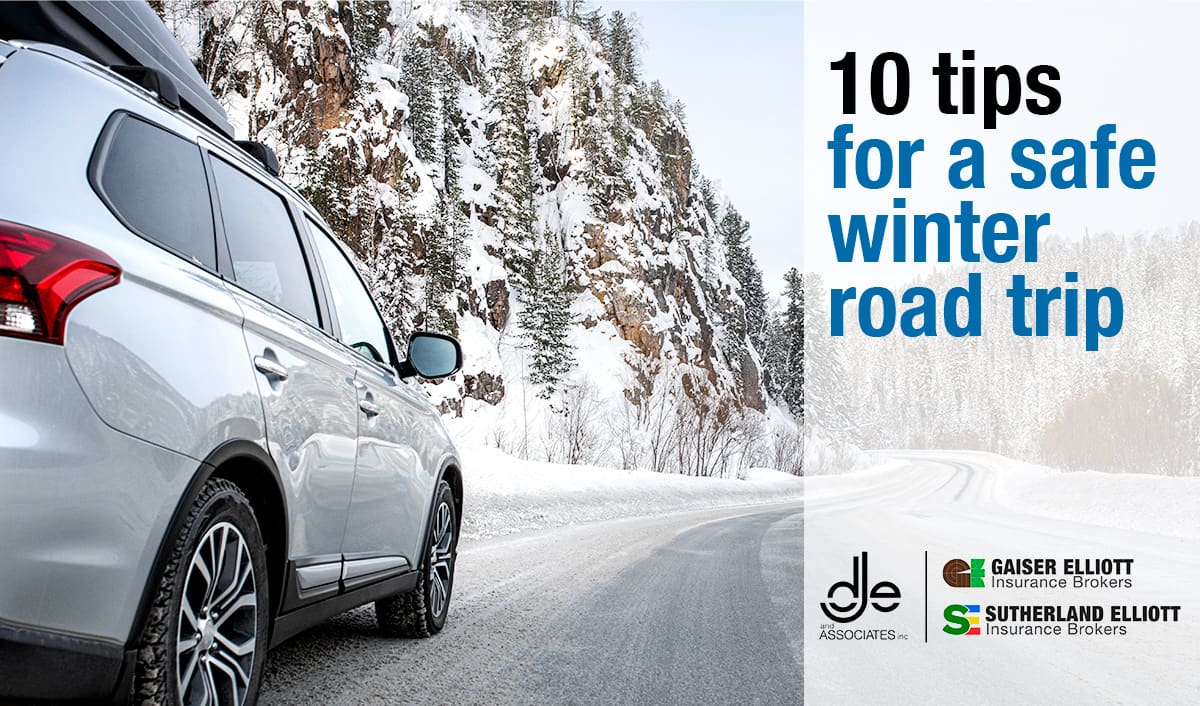
It’s no secret that many Canadians like to fly to warmer destinations for a little snow-free R&R in the winter months. But this winter, most of us will be staying closer to home and using our vacation days to explore our own beautiful country. You may have already prepared your vehicle for winter, but there are some other steps you can take to make your winter road trip a safe one. Whether you’re driving up to the cottage for a cozy weekend or visiting a friend who lives in another province, keep these tips in mind:
- Install your winter tires before you leave. As the temperature drops, all-season and summer tires can stiffen and start to lose their elasticity, which can lead to decreased traction and poor performance. The rubber used in winter tires, on the other hand, is designed to stay flexible even in extremely chilly weather, so you’ll get a better grip on a slippery street. If you haven’t yet installed your winter tires, do so before you hit the road.
- Check your vehicle’s fluids. If you’re almost due for an oil change, plan to have it done before you head out. While you’re at it, have your brake fluid, transmission fluid, coolant, and power-steering fluid checked, too.
- Top up your windshield washer fluid with a de-icing formula and keep an extra bottle in your trunk. Regular windshield washer fluid can freeze, either in its tank or when you spray it onto your windshield on a cold day. Windshield washer fluids that are specifically formulated for winter weather usually include higher concentrations of methyl alcohol, giving them a lower freezing point so they won’t freeze in your tank or cause dangerous refreeze in cold conditions. They can also melt thin layers of ice in temperatures as low as -49 C.
- Replace worn-out wiper blades. If you ever notice that some areas of your windshield stay wet after being wiped when it’s raining or snowing, replace your wiper blades — you’ll want them working well, especially if you’re driving in unfamiliar territory. Even if your wipers are in decent condition, you could consider swapping them with heavier, winter-specific ones that will wipe away ice and snow more easily.
- Prepare your winter driving emergency kit. If you don’t already have a well-stocked winter emergency kit in your vehicle, pack these 10 essential items before you leave for a trip where you’ll be on the road for an extended period of time.
- If you’re installing a roof rack on your vehicle for your travels, let your car insurance company know. While a roof rack can be a lifesaver when it comes to packing your vehicle for a road trip, installing one could also affect your insurance coverage. Be sure to let your broker know about your new roof rack to ensure you have the coverage you need when you’re on the road.
- Keep your gas tank at least half full. If you have to pull over and sit for a while to wait out a whiteout (or if you’re driving in an unfamiliar area and can’t find a gas station), the last thing you want to worry about is hitting empty and getting stranded in the cold.
- Protect your vehicle from theft. Nothing will ruin a road trip quite like waking up in the morning and finding that your vehicle it isn’t where you left it the night before. Take these important steps to protect your vehicle from theft, especially when you’re parking in an unfamiliar area.
- Be prepared to get caught in a blizzard. Whether you’re a new driver or a seasoned veteran, take these practical precautions for driving in a snowstorm to make sure you (and your vehicle) arrive safe and sound.
- Make sure your car insurance coverage is up to date. If it’s been a while since you’ve reviewed your car insurance policy, reach out to your broker to double check that you have the coverage you need for your trip — and keep your broker’s phone number on hand in case you need to make a claim while you’re away.
This winter, many of us will be using our vacation days to explore our own beautiful country. Whether you’re driving up to the cottage or visiting another province, keep these tips in mind for a safe journey.
Before you hit the road this winter, you should also do some research to make sure you understand the rules and restrictions in the area you’re planning to visit. Confirm that your destination is allowing visitors from other regions or provinces and find out if there are any additional guidelines you’ll need to follow while you’re there. Safe travels!
This article was originally posted on
economical.com

 519 681 0179
519 681 0179